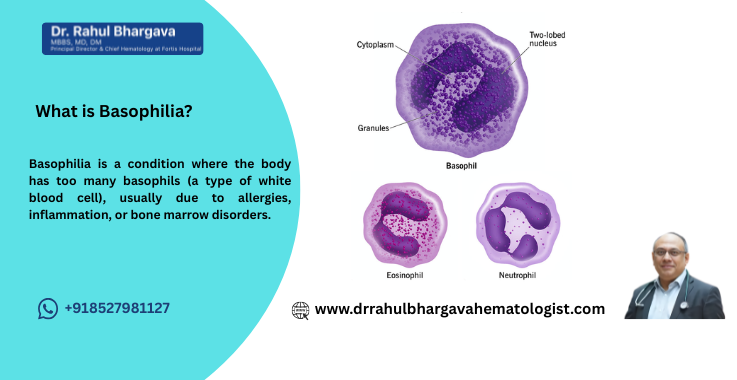Basophilia Treatment in India

Basophilia is a condition characterized by an increased number of basophils in the blood. Basophils are a type of white blood cell that plays a role in the immune system, particularly in the body’s response to allergic reactions and inflammation. They release histamine, heparin, and other substances that help mediate immune responses. Although basophils are normally present in small quantities in the bloodstream, their numbers can increase due to various underlying conditions.
Basophilia is typically identified through a complete blood count (CBC) with a differential, which counts the number of different types of blood cells. A high basophil count can be an indicator of various diseases or disorders, some of which may require further investigation and treatment.
Basophilia
Basophilia is a condition characterized by an elevated level of basophils, a type of white blood cell, in your bloodstream. Basophils play a key role in your immune system, particularly in inflammatory responses and allergic reactions. When your body produces too many basophils, it can indicate an underlying health issue such as chronic inflammation, infection, or even blood disorders like leukemia.
Causes of Basophilia
The causes of basophilia can vary widely and include:
- Allergic Reactions: Such as asthma, hay fever, or drug allergies.
- Chronic Infections: Like tuberculosis or certain viral infections.
- Inflammatory Disorders: Including rheumatoid arthritis or ulcerative colitis.
- Blood Disorders: Such as chronic myeloid leukemia (CML), polycythemia vera, or essential thrombocythemia.
- Endocrine Disorders: Like hypothyroidism (underactive thyroid).
- Autoimmune Diseases: Conditions like lupus can also trigger basophilia.
It’s important to consult a specialist like Dr. Rahul Bhargava for a detailed diagnosis and treatment plan.
Types of Basophilia
Basophilia can be classified into two main types based on the underlying cause:
- Reactive Basophilia: This is typically caused by allergic reactions, infections, or inflammation.
- Malignant Basophilia: This type is linked to blood cancers like leukemia or other bone marrow disorders.
Identifying the type of basophilia is critical to determining the correct treatment path.
Symptoms of Basophilia
Often, basophilia itself does not cause direct symptoms. Instead, you may experience symptoms related to the underlying condition causing it. These can include:
- Fatigue and weakness
- Unexplained weight loss
- Fever or night sweats
- Itchy skin or rashes
- Chronic cough or difficulty breathing (if related to allergies or asthma)
- Easy bruising or bleeding (in cases of blood disorders)
It’s important to visit a haematologist like Dr. Bhargava if you have any persistent or unexplained symptoms.
Diagnosis of Basophilia
To diagnose basophilia, your doctor will perform several tests:
- Complete Blood Count (CBC): Measures the number of basophils in your blood.
- Bone Marrow Biopsy: May be recommended to check for abnormalities in blood cell production.
- Cytogenetic Testing: Helps identify genetic changes in the blood cells, which is important for diagnosing blood cancers.
- Blood Smear: Examines your blood under a microscope to detect abnormal cells.
- Allergy Testing: If an allergic reaction is suspected.
With his extensive experience, Dr. Rahul Bhargava ensures a thorough evaluation to determine the root cause of basophilia and create a tailored treatment plan.
Treatment of Basophilia
Treatment for basophilia depends on the underlying cause. Here are the common treatment approaches:
- For Allergies or Inflammatory Conditions: Anti-inflammatory medications, antihistamines, or steroids may be prescribed.
- For Chronic Myeloid Leukemia or Other Blood Disorders: Targeted therapies, chemotherapy, or bone marrow transplants may be necessary.
- For Autoimmune Diseases: Immunosuppressants or other disease-modifying treatments may be used.
- Infections: Antibiotics or antiviral medications to treat underlying infections.
Cost of Treatment and Stay in India
The cost of treating basophilia in India is considerably more affordable compared to many Western countries, making it an appealing option for medical tourists. The total cost of treatment, including diagnosis, medications, and hospital stays, varies depending on the underlying cause of basophilia and the required treatment. Here’s an overview of the costs:
-
Initial Consultation:
USD: $30 – $100
INR: ₹2,200 – ₹7,400 -
Blood Tests (CBC, Bone Marrow Biopsy, Cytogenetic Testing, etc.):
USD: $50 – $200
INR: ₹3,700 – ₹14,800 -
Medications (Antihistamines, Anti-inflammatory, Steroids, etc.):
USD: $20 – $150 per month
INR: ₹1,500 – ₹11,100 per month -
Targeted Therapy for Blood Disorders:
USD: $1,000 – $3,000 per month
INR: ₹75,000 – ₹2,20,000 per month -
Hospital Stay (per night):
USD: $25 – $200
INR: ₹2,000 – ₹15,000 per night
India offers cost-effective healthcare options for treating basophilia, while maintaining high standards of medical care. Costs are significantly lower compared to many Western countries, allowing patients to receive top-quality treatment at a fraction of the price.
Frequently Asked Questions
No, but it can be a symptom of certain blood cancers like leukemia. Not all cases of basophilia are related to cancer.
You should consult a specialist like Dr. Rahul Bhargava to determine the cause and get a proper diagnosis.
The treatment and outcome depend on the underlying cause. Some cases, like those related to allergies or infections, are easily treatable, while others, like blood disorders, may require long-term management.